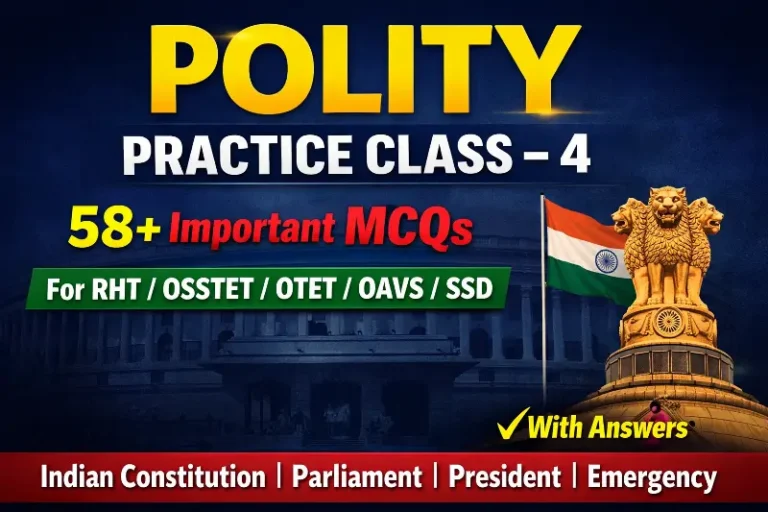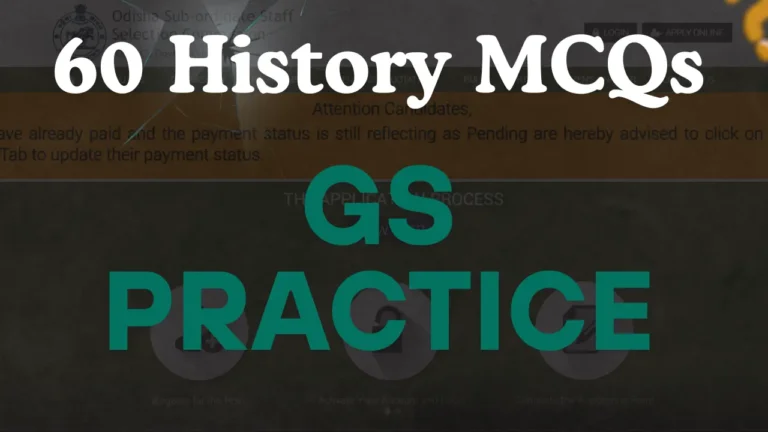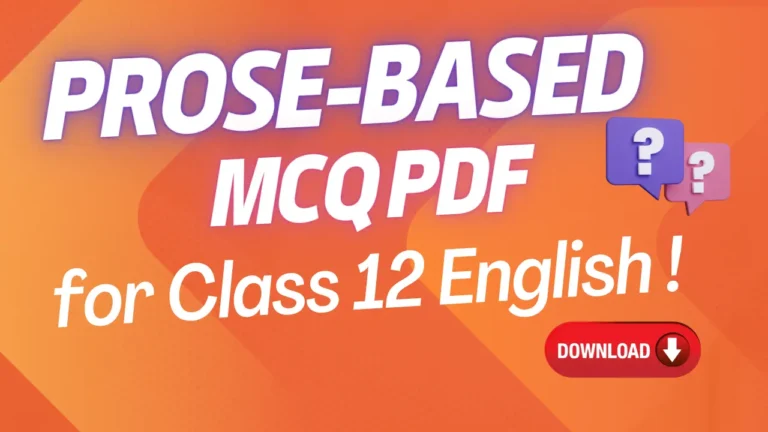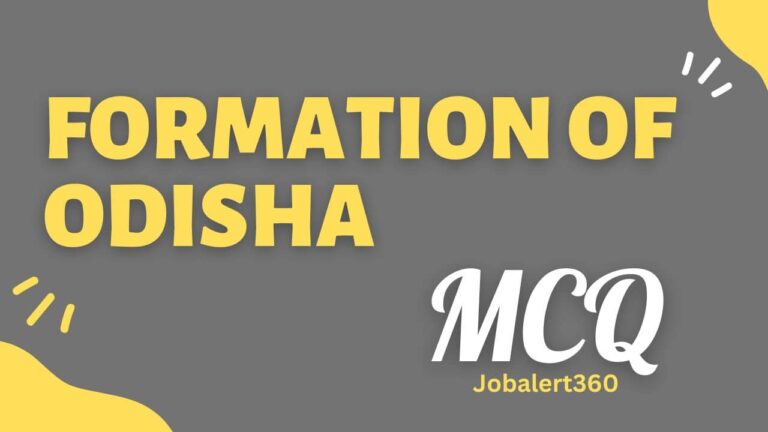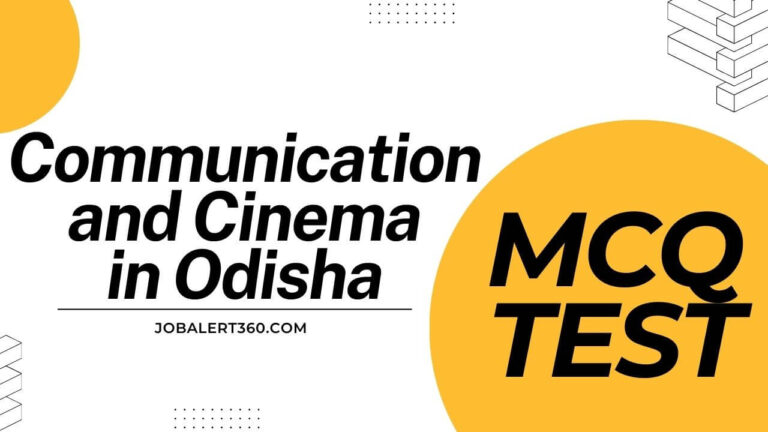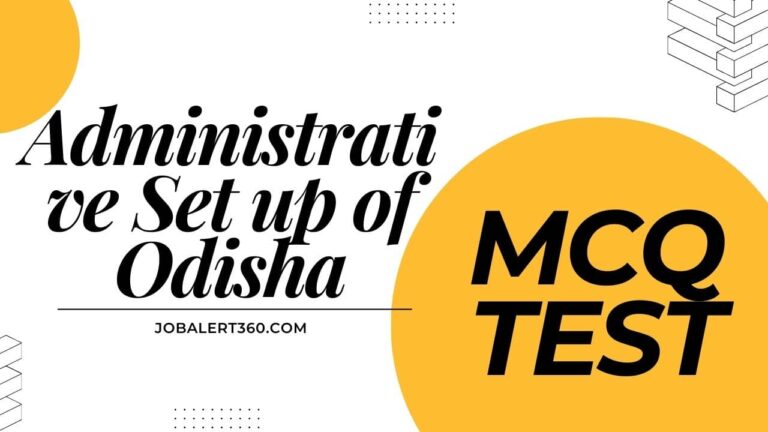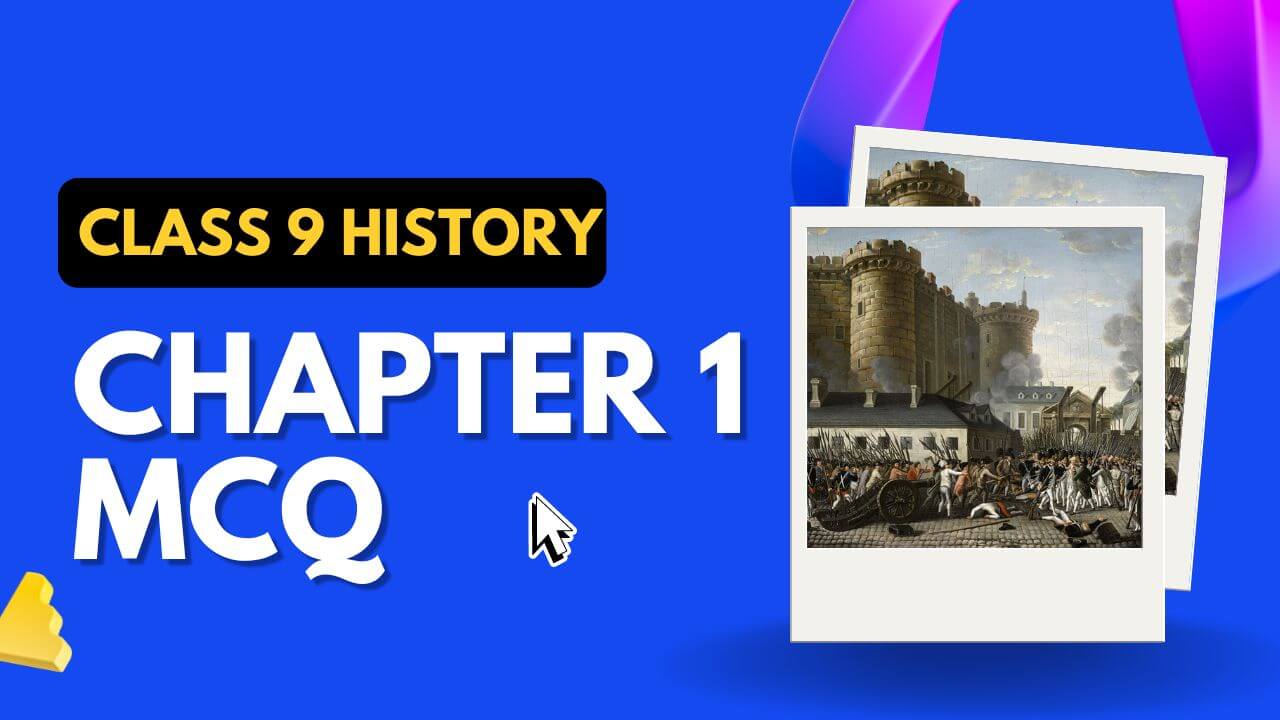
Class 9 History Chapter 1 MCQ
Prepare for your grade 9 history exam with MCQs and answers on Chapter 1: The French Revolution. Test your knowledge Class 9 History Chapter 1 MCQ quizzes.
NCERT Solutions for Class 9 Social Science History – India and the Contemporary World I
History Chapter 1 The French Revolution
History Chapter 2 Socialism in Europe and the Russian Revolution
History Chapter 3 Nazism and the Rise of Hitler
History Chapter 4 Forest Society and Colonialism
History Chapter 5 Pastoralists in the Modern World
History Chapter 6 Peasants and Farmers
History Chapter 7 History and Sport: The Story of Cricket
History Chapter 8 Clothing: A Social History
Class 9 History Chapter 1 MCQ
50 MCQs and Answers for Master Class 9 History Chapter 1 ‘French Revolution’. Enhance your understanding of this important historical event with comprehensive multiple-choice questions and accurate solutions.
Q1) Which ruler of France was known for his extravagant lifestyle and lack of foresight?
a) Louis XV
b) Louis XIV
c) Louis XVI
d) Louis XIII
Answer: Louis XVI – His extravagant spending on luxuries like Versailles contributed significantly to the financial crisis.
Q2) What contributed to the financial crisis in France during Louis XVI’s reign?
a) Excessive spending on infrastructure
b) High taxes on the nobility
c) Costly wars and maintenance of Versailles
d) Export bans on luxury goods
Answer: Costly wars and maintenance of Versailles – France’s wars and palace maintenance drained the treasury.
Q3) Who bore the burden of financing the state’s expenses through taxes in pre-revolutionary France?
a) The Clergy
b) The nobility
c) The bourgeoisie
d) The peasantry
Answer: The peasantry – They bore the brunt of taxation, while the privileged classes had exemptions.
Q4) Which intellectual movement influenced the middle class in pre-revolutionary France?
a) Romanticism
b) Enlightenment
c) Realism
d) Naturalism
Answer: Enlightenment – It emphasized reason, equality, and individual rights.
Q5) Who comprised the new middle class in France after the revolution?
a) The Clergy
b) The bourgeoisie
c) The nobility
d) The peasantry
Answer: The bourgeoisie – They gained political power and influence.
Q6) What happened to the clergy and nobility’s privileges after the revolution?
a) They retained their privileges intact.
b) They were forced to give up their privileges.
c) They gained more privileges.
d) They were exempted from taxes.
Answer: They were forced to give up their privileges.
Q7) Who among the following would have been disappointed with the outcome of the French Revolution?
a) Wealthy landowners
b) Peasants and labourers
c) The Clergy
d) The bourgeoisie
Answer: Peasants and labourers – They still faced economic hardship.
Q8) Which of the following was NOT a legacy of the French Revolution?
a) Spread of democratic ideals
b) Rise of absolutism
c) Emergence of nationalism
d) Colonized people’s struggle for freedom
Answer: Rise of absolutism – The revolution emphasized limited government.
Q9) Which region was significantly influenced by the ideas of the French Revolution?
a) Asia
b) Africa
c) Europe
d) South America
Answer: Europe – Inspired revolutions and uprisings.
Q10) Who among the following was influenced by the ideas of the French Revolution in India?
a) Mahatma Gandhi
b) Confucius
c) Shaka Zulu
d) Mansa Musa
Answer: Mahatma Gandhi – Advocated non-violent resistance.
Q11) Which democratic right ensures equal treatment under the law?
a) Right to education
b) Right to equality
c) Right to leisure
d) Right to privacy
Answer: Right to equality – Ensures fair treatment under the law.
Q12) Which democratic right guarantees the freedom to express opinions?
a) Right to freedom of speech
b) Right to bear arms
c) Right to own property
d) Right to healthcare
Answer: Right to freedom of speech.
Q13) Which aspect of the Declaration of Rights of Man and Citizen was unclear?
a) Women’s Rights
b) Right to property
c) Right to vote
d) Right to education
Answer: Women’s Rights – Women were excluded from equal rights.
Q14) What continued to exist in France despite the ideals of the French Revolution?
a) Slavery
b) Feudalism
c) Absolute monarchy
d) Serfdom
Answer: Slavery – Reinstated by Napoleon later.
Q15) What contributed to the rise of Napoleon in France?
a) Economic prosperity
b) Political stability
c) Cultural renaissance
d) Military victories
Answer: Military victories – Gained him popularity.
Q16) What title did Napoleon assume in 1804?
a) King
b) Emperor
c) President
d) Prime Minister
Answer: Emperor – Crowned himself.
Q17) What event led to Napoleon’s ultimate downfall?
a) The French Revolution
b) The Battle of Trafalgar
c) The Battle of Waterloo
d) The Hundred Days
Answer: The Battle of Waterloo – Ended his reign.
Q18) What is described as the conventional term denoting the end of the ancien régime in France?
a) Revolution of 1830
b) Revolution of 1848
c) Revolution of 1789
d) Counterrevolution of 1793
Answer: Revolution of 1789.
Q19) What was one of the general causes of the French Revolution?
a) The rise of the bourgeoisie
b) The decline of the clergy
c) The expansion of the feudal regime
d) The strengthening of the monarchy
Answer: The rise of the bourgeoisie.
Q20) Which event symbolized the beginning of the French Revolution?
a) Storming of the Bastille
b) Declaration of the Rights of Man
c) Execution of Louis XVI
d) Abolition of the monarchy
Answer: Storming of the Bastille.
Q21) Who led the radical faction during the Reign of Terror?
a) Maximilien Robespierre
b) Louis XVI
c) Marie Antoinette
d) Jacques Necker
Answer: Maximilien Robespierre.
Q22) What was the consequence of the Battle of the Nile?
a) French occupation of Malta
b) Victory for the French Navy
c) Destruction of Napoleon’s fleet
d) Expansion of the French Revolution to Egypt
Answer: Destruction of Napoleon’s fleet.
Q23) Which event marked the Directory’s end and the Consulate’s beginning?
a) Battle of Valmy
b) Coup d’état of 18 Fructidor
c) Execution of Robespierre
d) Treaty of Campo Formio
Answer: Coup d’état of 18 Fructidor.
Q24) What was one of the achievements of the National Constituent Assembly?
a) Establishment of a monarchy
b) Abolition of slavery
c) Rejection of the Rights Declaration
d) Restoration of feudalism
Answer: Abolition of slavery – In 1794.
Q25) Who led the French army during the Italian campaign in 1796?
a) Louis XVI
b) Robespierre
c) Napoleon Bonaparte
d) Horatio Nelson
Answer: Napoleon Bonaparte.
Q26) What was the significance of the Declaration of the Rights of Man and the Citizen?
a) It proclaimed liberty, equality, and fraternity.
b) It granted absolute power to the monarchy.
c) It established a theocracy.
d) It restricted common people’s rights.
Answer: It proclaimed liberty, equality, and fraternity.
Q27) What was the outcome of the Battle of Fleurus?
a) French defeat
b) Expansion of Coalition
c) Reoccupation of Belgium
d) Execution of Robespierre
Answer: Reoccupation of Belgium.
Q28) Which event marked the beginning of the aristocratic revolt in France?
a) Summoning of an assembly of “notables”
b) Rights Declaration
c) Storming of the Bastille
d) Execution of Louis XVI
Answer: Summoning of an assembly of “notables”.
Q29) What role did Jacques Necker play during the early stages of the French Revolution?
a) Led counterrevolution
b) Advocated fiscal reforms
c) Organized Estates-General
d) Supported aristocracy
Answer: Advocated fiscal reforms.
Q30) What prompted the Parisian crowd to storm the Bastille on July 14, 1789?
a) Famine and hardship
b) Royal tax decree
c) Imprisonment of dissidents
d) Abolition of monarchy
Answer: Imprisonment of dissidents.
Q31) What was the significance of the Declaration of the Rights of Man and the Citizen?
a) Constitutional monarchy
b) Fundamental rights for citizens
c) Power to clergy
d) Abolished National Assembly
Answer: Fundamental rights for all citizens.
Q32) Who declared themselves the National Assembly on June 17, 1789?
a) Clergy
b) Nobility
c) Third Estate
d) Bourgeoisie
Answer: Third Estate.
Q33) What was the main purpose of the National Constituent Assembly?
a) Establish dictatorship
b) Restore monarchy
c) Draft a constitution
d) Suppress dissent
Answer: Draft a new constitution.
Q34) What action did the Parisian crowd take on October 5, 1789?
a) Storming of the Bastille
b) Execution of Louis XVI
c) March to Versailles
d) National Convention formed
Answer: March to Versailles.
Q35) What was the outcome of the Battle of Valmy?
a) French defeat
b) Monarchy restored
c) Austrian surrender
d) French victory
Answer: French victory.
Q36) What was the primary reason for the rise of the Reign of Terror?
a) Economic prosperity
b) Military victories
c) Internal dissent and threats
d) Political stability
Answer: Internal dissent and threats.
Q37) Who led the French government during the Directory?
a) Robespierre
b) Louis XVI
c) Napoleon Bonaparte
d) Jacques Necker
Answer: Napoleon Bonaparte.
Q38) What were the main causes of the French Revolution of 1789?
a) Economic, political, and intellectual
b) Economic, social, and philosophical
c) Social, political, and cultural
d) Social, economic, political, and intellectual
Answer: Social, economic, political, and intellectual.
Q39) When did the French Revolution begin?
a) July 14, 1789
b) June 17, 1789
c) August 4, 1789
d) September 3, 1791
Answer: July 14, 1789.
Q40) What event marked the beginning of the French Revolution?
a) The storming of the Bastille
b) Rights Declaration adopted
c) Execution of Louis XVI
d) Tennis Court Oath
Answer: The storming of the Bastille.
Q41) Who was the Bourbon king of France during the French Revolution?
a) Louis XIV
b) Louis XV
c) Louis XVI
d) Louis XVII
Answer: Louis XVI.
Q42) Which stage of the French Revolution saw the Reign of Terror?
a) Stage I
b) Stage II
c) Stage III
d) Stage IV
Answer: Stage II.
Q43) When was Louis XVI executed?
a) January 21, 1789
b) January 21, 1793
c) August 10, 1792
d) August 22, 1795
Answer: January 21, 1793.
Q44) Who led the extremist faction during the Reign of Terror?
a) Georges Danton
b) Maximilien Robespierre
c) Napoleon Bonaparte
d) Louis XVI
Answer: Maximilien Robespierre.
Q45) What marked the end of the French Revolution?
a) Execution of Louis XVI
b) Establishment of the Directory
c) Rights Declaration
d) Overthrow of National Convention
Answer: Establishment of the Directory.
Q46) What was the significance of the French Revolution?
a) Ended feudalism, inspired other revolutions
b) Established monarchy
c) Napoleon’s rise
d) Monarchy restored
Answer: Ended feudalism, inspired other revolutions.
Q47) Who played a pivotal role in exposing the fault lines of the old political system in France?
a) Louis XVI
b) Georges Danton
c) Maximilien Robespierre
d) Enlightenment philosophers like Rousseau
Answer: Enlightenment philosophers like Rousseau.
Note: These are just possible answers based on the Internet information. For a more in-depth understanding, consult reliable historical sources.
Recent Blog post-MCQ
| Ancient History of Odisha MCQ | Click Here |
| Medieval History of Odisha MCQ – UPSC Level MCQ Test | Click Here |
| Modern History of Odisha MCQs and Answers | Click Here |
| Freedom Struggle in Odisha MCQs | Click Here |
| Agriculture and Irrigation in Odisha MCQ | Click Here |
| Industries of Odisha MCQ | Click Here |
| Mineral Resources of Odisha MCQ | Click Here |
| Mathematical Operation Questions and Answer | Click Here |
| Administrative Set up of Odisha MCQ | Click Here |
| Communication and Cinema in Odisha MCQ | Click Here |
| Formation of Odisha MCQ | Click Here |

